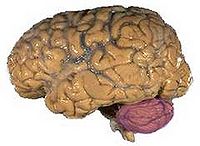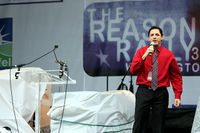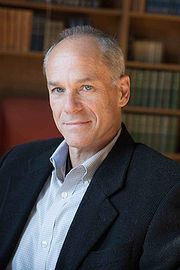Atheists And Unreasonableness
 From Conservapedia
From Conservapedia 
If naturalism is true, then we ought not to trust our capacity for reason, for the human brain would be a byproduct of blind/unintelligent natural forces. [1] Therefore, believing in naturalism is self-defeating.
In short, atheism/naturalism and reason are incompatible (see: Atheism and reason).[2]
Contents
- 1 Unreasonableness of atheism
- 2 Atheism, irrationality and logic
- 3 Atheism and open-mindedness
- 4 Atheism and critical thinking
- 5 Atheism and gullibility
- 6 4 reasons why the atheist worldview is incoherent
- 7 Atheists, unreasonableness and social skills
- 7.1 Blair Scott about atheist infighting with the atheist movement
- 7.2 Atheist Neil Carter on the biting and critical nature of atheists
- 7.3 Atheist Eddie Tabash on atheist cantankerousness
- 7.4 Atheist PZ Myers on current rifts within the atheist movement
- 7.5 Journal of Contemporary Religion on schisms within U.S. atheism
- 8 Atheism and emotional problems
- 9 Atheism and arrogance
- 10 Atheists and conflict resolution
- 11 Atheism and sociopathy
- 12 Atheism and immorality
- 13 Atheism and mental illness
- 14 Physicist Marcelo Gleisler on the unreasonableness of atheists
- 15 Encyclopedia Britanica on atheism, arrogance and pretentiousness
- 16 Atheist Brendan O'Neill on the unreasonableness of atheists
- 17 See also
- 18 Books on the unreasonableness of atheism
- 19 External links
- 20 Notes
Unreasonableness of atheism[edit]
See also: Atheism and foolishness
Articles:
- 5 Reasons Why Atheism is Foolish
- The Folly of Atheism, 10 Minute Apologetics
- The Foolishness of Atheism by Eric Lyons, M.Min.
- The Bankruptcy of Atheism
- Atheism: The religion of fools, D. James Kennedy Ministries
Videos:
- Claiming to Be Wise, the Atheists Become Fools - Tim Conway
- How To Answer The Fool (Atheism), ApologiaStudios
- Atheism: The Religion of Fools, D. James Kennedy
- The Atheist Delusion Movie (2016)
- Why Is Atheism Unreasonable? by Frank Turek
Atheism, irrationality and logic[edit]
See also: Atheism and irrationality and Atheism and logic
A common and legitimate criticism of the atheist worldview is that atheism is irrational (See: Atheism and irrationality).[3]
See also: List of logical fallacies that atheists commonly commit at: Atheism and logical fallacies
Atheism and open-mindedness[edit]
See also: Atheism and open-mindedness and Atheism and dogmatism and Atheism and intolerance and Atheism and groupthink
Research indicates that atheists are less open-minded (see: Atheism and open-mindedness).
Atheism and critical thinking[edit]
See also: Atheism and critical thinking
Tony Wichowsk of the Christian Apologetics Alliance wrote:
| “ | ,,,I have encountered numerous atheists and other critics of Christianity who by all accounts have stopped thinking critically themselves. The common perception among them is that by being critical of religion (particularly Christianity in the west), they are exercising critical thinking. However, critical thinking implies not only questioning authority and commonly held views, but your own views as well.
Critical thinking has often been popularly described as “thinking about thinking.” Stephen Brookfield is an award winning expert on education and teaching critical thinking skills. Below is his definition of what critical thinking really is.
– Stephen Brookfield Developing critical thinkers: Challenging adults to explore alternative ways of thinking and acting. (1987, Page 9) If an atheist wants to be a good critical thinker, and not simply a cynic, I would recommend that he or she would do as Brookfield suggests, and check their assumptions. This might entail opening a book by an apologist that they do not like, such as William Lane Craig or a conservative text critic like Daniel B Wallace, and be open minded that they might have some things right. Checking multiple sources that disagree with each-other and weighing the evidence in your mind is sometimes tedious, but in the end it is worth it.[4] |
” |
The fallacy of exclusion is a logical fallacy where "Important evidence which would undermine an inductive argument is excluded from consideration. The requirement that all relevant information be included is called the 'principle of total evidence'.".[5] Atheists avoiding and ignoring the many legitimate arguments against atheism and for theism are engaging in fallacious reasoning (see also: Rebuttals to atheist arguments).
Atheism and gullibility[edit]
See also: Atheism and gullibility
There are multiple instances of atheists believing in pseudoscience, superstition and unsound medical practices (see: Atheism and gullibility).
4 reasons why the atheist worldview is incoherent[edit]
See: Atheism and incoherency (4 reasons why the atheist worldview is incoherent)
Atheists, unreasonableness and social skills[edit]
See also: Atheism and social/interpersonal intelligence and Atheism and empathy
.jpg)
The atheist PZ Myers, quoting fellow leftist Alex Nichols, said that jibes associating outspoken atheists with neckbeards (among other things) caused many liberals/leftists to leave the atheist tent and those who remained for the most part lacked in social skills and self-awareness.[6] See also: Atheism and social outcasts
According to an international study done by William Bainbridge, atheism is frequent among people whose interpersonal social obligations are weak and is also linked to lower fertility rates in advanced industrial nations (See also: Atheism and fertility rates).[7]
An ex-atheist wrote: "As an Atheist for 40 years, I noticed that there is not just a wide variety of Atheist positions, but there exists an actual battle between certain Atheist factions."[8] See also: Atheist factions and Schools of atheist thought
Jacques Rousseau wrote in the Daily Maverick: "Elevatorgate..has resulted in three weeks of infighting in the secular community. Some might observe that we indulge in these squabbles fairly frequently."[9]
In terms of politics and atheist infighting, there is friction between right-wing atheists (and right of center atheists) and secular leftist. See: Atheism and politics and Western atheism, schisms and political polarization
In 2017, atheist David Smalley has indicated that leftist/progressive atheists were "killing the atheist movement" through being contentious and divisive.[10] Smalley indicated that the atheist movement was disintegrating.[11]
The website Atheism and the City wrote about the 2018 cancellation of the first major atheist conference to be held in New York City:
| “ | But none of this is going to happen now because the event has just been canceled. The reasons why are complicated, but it started out difficult enough. The atheist community has splintered into a million shards in recent years. There are the atheist feminists and the atheist anti-feminists, the social justice warrior atheists and the anti-social justice warrior atheists. The pro-PC atheists and the anti-PC atheists. There are pro-Trump atheists and anti pro-Trump atheists. Atheists are split over gamergate, elevatorgate, whether we should organize, or whether we should even call ourselves atheists at all. The divisions go on and on.[12] | ” |
In 2017, the atheist PZ Myers, quoting fellow leftist Alex Nichols, wrote:
| “ | ...the growing popularity of jibes associating outspoken atheists with fedoras, neckbeards, and virginity, led to an exodus of liberals and leftists from the “atheist” tent. Those who remained for the most part lacked in social skills and self-awareness, and the results were disastrous.[13] | ” |
At the 2018 American Atheists convention, the ex-president of the American Atheist organization David Silverman declared:
| “ | It is a hard time to be an atheist activist. This has affected us. And it has affected our community...
...it has really affected us. We are suffering a level of defeatism that I have never seen before... And people are reacting to each other now. And so that is causing a division. Lots and lots of division in our movement. Hard, bad division... And that has resulted in a splintering and factioning of the movement that I have never seen before and none of us have. In other words, we're in a bad situation and it's getting worse.[14] |
” |
Numerous atheists have declared that the "atheist movement is dead/dying" (see: Decline of the atheist movement)[15]
Blair Scott about atheist infighting with the atheist movement[edit]
See also: Atheist movement and Atheism and anger and Atheism and bitterness
Blair Scott served on the American Atheists board of directors. Mr. Scott formerly served as a State Director for the American Atheists organization in the state of Alabama. On December 1, 2012 he quit his post as a director of outreach for the American Atheist due to infighting within the American atheist movement.[16]
Mr. Blair wrote: "I have spent the last week mulling over what I want to do at this point in the movement. I’m tired of the in-fighting: at every level. I am especially tired of allowing myself to get sucked into it and engaging in the very behavior that is irritating..me."[16]
Atheist Neil Carter on the biting and critical nature of atheists[edit]
The atheist Neil Carter wrote: "Friends of mine have noted lately how biting and critical the atheist community can be, not only toward outsiders, but even toward its own members. Has there ever been a subculture more prone to eating its own than this one? I really don’t know."[17]
Atheist Eddie Tabash on atheist cantankerousness[edit]
See also: Atheism and social skills and Atheism and emotional intelligence and Views on atheists
The American atheist activist Eddie Tabash said in a speech to the Michigan Atheists State Convention, "Since we are a bit of a cantankerous, opinionated lot...".[18]
Atheist PZ Myers on current rifts within the atheist movement[edit]
The atheist PZ Myers said about the current rifts in the atheist movement: "So deep and wide we’ve separated into two continents."[19]
Journal of Contemporary Religion on schisms within U.S. atheism[edit]
- See also: American atheism
The Journal of Contemporary Religion says about schisms within atheism: "The persistence of internal schisms and regular outbreaks of in-fighting within the atheist movement also ensure that much energy is effectively wasted on parochial concerns and further undermine attempts to establish a genuine sense of group cohesion."[20]
The Journal of Contemporary Religion say that internal divisions within the American atheist movement have to do with:
| “ | internal divisions within the movement around issues relating to goals, strategies, and direction. These can be seen most notably in debates about the formation of a collective ‘atheist’ identity, in disputes about the effectiveness of confrontationalism and accommodationism, and in concerns about the movement’s ethnic, racial, and gender profile.[20] | ” |
See also: Atheism and women and Western atheism and race
Atheism and emotional problems[edit]
See also: Atheism and emotional problems
Atheists are more prone to various emotional problems (see: Atheism and emotional problems).
Atheism and arrogance[edit]
- Atheism and arrogance (Atheism is an arrogant worldview. Various arrogant atheists)
Atheists and conflict resolution[edit]
See: Atheists and conflict resolution
Atheism and sociopathy[edit]
Atheism and immorality[edit]
See also: Atheism and morality

Not possessing a religious basis for morality, which can provide a basis for objective morality, atheism is fundamentally incapable of providing a coherent system of morality (see: Atheism and morality).[21] See also: Atheism and ethics and Atheism and the problem of evil
For example, atheists have been the biggest mass murderers in history (see: Atheism and mass murder). Dr. R. J. Rummel's mid estimate regarding the loss of life due to atheistic communism is that communism caused the death of approximately 110,286,000 people between 1917 and 1987 (See also: Atheism and communism).[22]
Atheism and various types of immorality:
Atheism and mental illness[edit]
See also: Atheism and mental illness

Atheism and mental illness is an increasingly important topic of study in light of the growing list of atheist shooters and serial killers.
Global News reported:
| “ | Children who are raised with religious or spiritual beliefs tend to have better mental health into their adulthood, a new study from the Harvard T.H. Chan School of Public Health found.
According to the study’s findings, people who attended weekly religious services or prayed or meditated daily in their childhood reported greater life satisfaction in their 20s. People who grew up in a religious household also reported fewer symptoms of depression and lower rates of post-traumatic stress disorder.[24] |
” |
See also: Atheism and depression
Atheism and depression[edit]
See also: Atheism and depression and Atheism and loneliness
Concerning atheism and depression, a University of Michigan study involving 19,775 individuals found that religious people are less likely than atheists to suffer depression when they are lonely.[26] See also: Atheism and suicide
The Telegraph reported: "Patients with a strong “intrinsic faith” (a deep personal belief, not just a social inclination to go to a place of worship) recover 70 per cent faster from depression than those who are not deeply religious."[27]
In addition, in many atheistic cultures in the developed world, there are considerable problems with loneliness (see: Atheism and loneliness). Furthermore, many atheists feel isolated within theistic cultures (see: Atheism and social outcasts).
Atheism and suicide[edit]
See also: Atheism and suicide
The journal article A global perspective in the epidemiology of suicide, published in the academic journal Suicidologi, found that "At 25.6, the total suicide rate is markedly highest in Atheist countries (e.g. China) which included in this analysis countries where religious observances had been prohibited for a long period of time (e.g. Albania)."[28]
Atheism and psychopathy[edit]

Psychopathy is strongly correlated with crime, violence, and antisocial behavior.[30][31] See also: Irreligion, psychopathy, crime, violence and antisocial behavior
See also: Atheism and psychopathy
A psychopath is someone with an anti-social personality disorder characterized by violent, perverted or immoral behavior often leading to criminality. Psychopaths have little or no concern for other people. Some psychopaths equate love with sexual arousal.[32]A few studies have found that there is a positive correlation of atheism and psychopathy (see: Atheism and psychopathy.
Atheism, autism, schizophrenia and genetic mutations[edit]
See also: Atheists and genetic mutations
Left-handedness is a good indicator of a high mutational load.[33] People who are left-handed higher incidences of autism and schizophrenia.[34] A study found that atheists are more likely to be left-handed (see: Atheists and genetic mutations).[35][36]
For additional information, please see:
Secular leftists and psychogenic illness[edit]
See: Secular leftists and psychogenic illness
Physicist Marcelo Gleisler on the unreasonableness of atheists[edit]
See also: Atheism and science and Atheism and consciousness
The Scientific American in its article entitled Atheism Is Inconsistent with the Scientific Method, Prizewinning Physicist Says quotes Templeton Prize winning physicist Marcelo Gleiser declaring:
| “ | I honestly think atheism is inconsistent with the scientific method. What I mean by that is, what is atheism? It’s a statement, a categorical statement that expresses belief in nonbelief. “I don’t believe even though I have no evidence for or against, simply I don’t believe.” Period. It’s a declaration. But in science we don’t really do declarations. We say, “Okay, you can have a hypothesis, you have to have some evidence against or for that.”...
When you look out there at the other planets (and the exoplanets that we can make some sense of), when you look at the history of life on Earth, you will realize this place called Earth is absolutely amazing. And maybe, yes, there are others out there, possibly—who knows, we certainly expect so—but right now what we know is that we have this world, and we are these amazing molecular machines capable of self-awareness, and all that makes us very special indeed. And we know for a fact that there will be no other humans in the universe; there may be some humanoids somewhere out there, but we are unique products of our single, small planet’s long history.[37] |
” |
Encyclopedia Britanica on atheism, arrogance and pretentiousness[edit]
See also: Atheism and pretentiousness
The Encyclopedia Britanica (Edinborough 1771) in its article on atheism declared: "Many people both ancient and modern have pretended to atheism or have been reckoned atheists by the world, but it is justly questioned whether any man seriously adopted such a principle. These pretentions therefore must be founded on pride or affection."[38]
Atheist Brendan O'Neill on the unreasonableness of atheists[edit]
See also: Atheism quotes
"These days, barely a week passes without the emergence of yet more evidence that atheists are the most irritating people on Earth." - the atheist Brendan O'Neill, The Telegraph, "How Atheists Became the Most Colossally Smug and Annoying People on the Planet", August 14, 2013 [39]
See also[edit]
- Rebuttals to atheist arguments
- The fool says in his heart, "There is no God."
- Causes of atheism
- Atheism and arrogance
- Atheism and anger
- Atheism and groupthink
- Atheism and foolishness
- Atheism and motivation
- Atheism and knowledge
- Atheism, divorce, addiction, sexual satisfaction, social skills, dysfunctional beliefs and attitudes, and irrationality
Books on the unreasonableness of atheism[edit]
- Reasonable Faith: Christian Truth and Apologetics by William Lane Craig, Crossway Books; 3rd edition (June 30, 2008)
- I Don't Have Enough Faith to Be an Atheist by Norman Geisler and Frank Turek, Crossway Books; STIFF WRAPS edition (March 12, 2004)
- There is a God: How the World's Most Notorious Atheist Changed His Mind by Anthony Flew (2007) with Roy Abraham Varghese (ISBN 978-0-06-133529-7)
- A Defense of the Integrity of Antony Flew's "There is a God" From His Own Letters by Anthony Horvath, Publisher: Athanatos Christian Ministries, September 3, 2011 [1]
- The folly and unreasonableness of atheism demonstrated from the advantage and pleasure of a religious life, the faculties of humane souls, the structure of animate bodies, & the origin and frame of the world by Richard Bentley (1662-1742)
External links[edit]
- Unreasonable Doubt by Jim Spiegal, Christianity Today
- Irrational Disbelief: The Hypocrisy of Scientific Atheism, Crisis Magazine
- The Human Limitations of Unreasonable Atheism
Notes[edit]
- ↑
- C.S. Lewis' argument from reason
- C.S. Lewis and the Argument from Reason by Jay W. Richards, November 25, 2013
- C.S. Lewis and Materialism by John G. West
- C.S. Lewis On The Validity of Reasoning
- C.S. Lewis on Rationality and Materialism
- Naturalism's Hot Water
- ↑
- C.S. Lewis' argument from reason
- C.S. Lewis and the Argument from Reason by Jay W. Richards, November 25, 2013
- C.S. Lewis and Materialism by John G. West
- C.S. Lewis On The Validity of Reasoning
- C.S. Lewis on Rationality and Materialism
- Naturalism's Hot Water
- ↑ Atheism by Matt Slick
- Putting the Atheist on the Defensive by Kenneth R. Samples, Christian Research Institute Journal, Fall 1991, and Winter 1992, page 7.
- Atheists don’t own reason by Tom Gilson
- Why the Burden of Proof is on the Atheist by Professor Ralph McInerny
- Theism, Atheism, and Rationality by Alvin Plantinga
- The Irrational atheist: Dissecting the Unholy Trinity of Dawkins, Harris, and Hitchens by Vox Day, Benbella Books, Dallas, TX, 2008 , ISBN 1933771364; ISBN 978-1933771366
- ↑ What Is the Value of Freethought
- ↑ http://onegoodmove.org/fallacy/exclus.htm
- ↑ Poisoning of a movement by PZ Myers
- ↑ Bainbridge, William (2005). "Atheism" (PDF). Interdisciplinary Journal of Research on Religion. 1 (Article 2): 1–26.
- ↑ An atheist new world order? Is the Rational Response Squad making an attempt?
- ↑ Sticks and stones may break my bones, but words can rip my soul
- ↑ Reasonably Controversial: How the Regressive Left Is Killing the Atheist Movement by David Smalley
- ↑ Reasonably Controversial: How the Regressive Left Is Killing the Atheist Movement by David Smalley
- ↑ The Atheist Conference is Dead
- ↑ Poisoning of a movement by PZ Myers
- ↑ David Silverman - How the Mighty Get Back Up
- ↑
- The “Atheism Movement:” Dead or Alive?, Freethought Blogs
- Atheist activist Seth Andrews keeps seeing reports on social media and the media that the atheist movement is dying, Examining Atheism
- Atheist Aron Ra indicates the atheist movement is dead. Now that that Aron Ra has surrendered...., Examining Atheism
- The Day the Atheist Movement Died by Jack Vance at Atheist Revolution
- Jennifer McCreight on Twitter about the Elevatorgate scandal destroying the atheist movement, Jen McCreight, Twitter
- ↑ 16.0 16.1 An Open Letter from Blair Scott
- ↑ It’s Past Time for Atheism to Grow Up by Neil Carter
- ↑ Atheists Speak Up - Eddie Tabash - Part 2 of 4
- ↑ Get Out! A message for the atheist movement by PZ Myers
- ↑ 20.0 20.1 Divided We Stand: The Politics of the Atheist Movement in the United States by Steven KettellJournal of Contemporary Religion, Volume 29, Issue 3, 2014
- ↑
Paul Copan
- Can Moral Objectivism Do Without God? by Peter S. Williams
- Atheists and the Quest for Objective Morality by Chad Meister
- The failure of atheism to account for morality
- ↑ Rummel, R. J. (November 1993). "How many did communist regimes murder?" University of Hawaii website; Freedom, Democracy, Peace; Power, Democide, and War. Retrieved July 19, 2014.
- ↑ Mueller, Dr. Paul S. et al. (December 2001). "Religious involvement, spirituality, and medicine: implications for clinical practice". Mayo Clinic Proceedings vol. 76:12, pp. 1225-1235. Retrieved from Mayo Clinic Proceedings website on July 20, 2014.
- ↑ Religion can help improve children’s mental health, new study finds, Global News, 2018
- ↑ Adherents.com - suicide rates
- ↑ Lonely religious people are less depressed than atheists because they see God as a friend replacement, study finds, Daily Mail, 2018
- ↑ What God does to your brain by Julia Llewellyn Smith. The Telegraph, 20 Jun 2014
- ↑ José Maoel Bertolote, Alexandra Fleischmann (2002). "A global perspective in the epidemiology of suicide". Suicidologi 7 (2). https://www.iasp.info/pdf/papers/Bertolote.pdf.
- ↑ Serial Killer Jeffrey Dahmer blames Atheism and Evolution belief for Murders
- ↑ (2005) Handbook of Psychopathy. Guilford Press, 440–3.
- ↑ Coid, Jeremy; Yang, Min; Ullrich, Simone; Roberts, Amanda; Moran, Paul; Bebbington, Paul; Brugha, Traolach; Jenkins, Rachel et al. (May 2009). [Psychopathy among prisoners in England and Wales "Psychopathy among prisoners in England and Wales"]. International Journal of Law and Psychiatry (Elsevier Ltd) 32 (3): 134–41. doi:10.1016/j.ijlp.2009.02.008. PMID 19345418. Psychopathy among prisoners in England and Wales. Retrieved 1 April 2016.
- ↑ Robert D. Hare (2011). Without Conscience: The Disturbing World of the Psychopaths Among Us. Guilford Press, 52. ISBN 978-16062-35782.
- ↑ RELIGIOUS PEOPLE LIVE HEALTHIER, LONGER LIVES—WHILE ATHEISTS COLLECT MUTANT GENES, Newsweek, 2017
- ↑ Atheists are more likely to be left handed, study finds, The Telegraph, 2017
- ↑ RELIGIOUS PEOPLE LIVE HEALTHIER, LONGER LIVES—WHILE ATHEISTS COLLECT MUTANT GENES, Newsweek, 2017
- ↑ Atheists are more likely to be left handed, study finds, The Telegraph, 2017
- ↑ Atheism Is Inconsistent with the Scientific Method, Prizewinning Physicist Says, Scientific American
- ↑ The Repressive Denials of Atheism in Britain in the Seventeenth and Eighteenth Centuries by David Berman, Proceedings of the Royal Irish Academy: Archaeology, Culture, History, Literature Vol. 82C (1982), pp. 211-246. Published by: Royal Irish Academy https://www.jstor.org/stable/25506089
- ↑ Brendan O'Neill (August 14, 2013). "How atheists became the most colossally smug and annoying people on the planet". The Telegraph website/Brendan O'Neill [blog]. Retrieved on October 3, 2014. [atheist author]
Categories: [Atheism] [Sociology]
↧ Download as ZWI file | Last modified: 02/22/2023 16:11:55 | 185 views
☰ Source: https://www.conservapedia.com/Atheists_and_unreasonableness | License: CC BY-SA 3.0
 ZWI signed:
ZWI signed:




 KSF
KSF